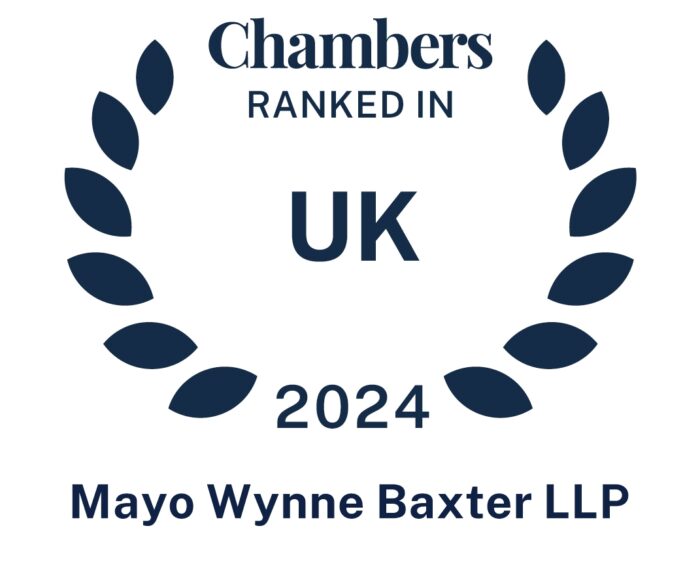
Children Law Solicitors
Expert, supportive advice for parents and grandparents when it matters most.
Jump to section...
Children’s law, parental & grandparental advice
Following the breakdown of any relationship, parents often need support in reaching an agreement relating to future arrangements for the children. It’s a stressful time for all, but here at Mayo Wynne Baxter we can help.
We offer expert guidance and advice, covering the Children Act 1989, parental and grandparent law.
Our specialist children’s solicitors look after clients across Sussex, with offices in Brighton, Chichester, Crawley, Eastbourne, East Grinstead, Lewes, Peacehaven, Seaford and Storrington, as well as London.
Parental responsibility and parental law
The law defines parental responsibility as: the rights, duties, powers, responsibilities and authority which by law a parent has in relation to the child and administration of his or her property.
A mother automatically obtains parental responsibility for a child. However, the father will only have automatic parental responsibility if they are or have been married to the mother since the birth of the child, or if after 1 December 2003, they are named on the child’s birth certificate.
The law states that a person with parental responsibility must be consulted on all major decisions relating to the child. This includes everything from where the child should go to school to where they should live, whether they can be taken outside the UK and whether they should have any medical treatment.
Sometimes parents are unable to reach an agreement between themselves on how best to care for the children, so you may need legal help from a specialist family lawyer to decide what is in their best interests and how that can be managed between you. You may also need to apply to the Court for a Child Arrangements Order (CAO).
The Children Act 1989
The law to determine child arrangements is set out in the Children Act 1989. The Children Act removed concepts of child “custody” and “access” and changed them to “residence” and “contact”.
The terms have now been changed further to an overriding concept of “child arrangements”, providing for who the child “lives with” and who they should “spend time with.”
If you can not agree on arrangements for your children after separation, you can apply for a Child Arrangements Order, which will define the arrangements for you.
Parental court orders
The court has the power to make two other types of parental court order: Prohibited Steps and Specific Issue Orders.
- A Prohibited Steps Order limits or prevents when certain parental rights and duties can be exercised.
- A Specific Issue Order contains directions to resolve a particular issue in dispute in connection with the child.
For example, either of these could be obtained where there is a dispute in respect of a number of issues including involving the child’s education, or medical treatment.
The court does not grant either of these Orders lightly. They are never granted in order to put unwarranted obstacles between a child and their parent.
When making an Order, the following four principles are considered:
- The children’s welfare is of paramount importance.
- Any delay in resolving arrangements for the children is likely to prejudice the welfare of the children.
- The court will not make an Order unless it considers that doing so would be better for the children than making no Order at all. This is the No Order Principle. The court will not make an Order if the parents can agree things between themselves.
- It is presumed, unless the contrary is shown, that involvement of both parents in the child’s life will further their welfare.
The Welfare Checklist
What needs to be taken into account when determining child arrangements is set out in Section 1 (3) of the Children Act 1989. They are known collectively as the “Welfare Checklist”.
They are:
- The ascertainable wishes and feelings of the child concerned (considered in the light of his/her age and understanding).
- Their physical, emotional and educational needs.
- The likely effect on them of any change in circumstances.
- Their age, sex, background and any characteristics which the court considers relevant.
- Any harm which they have suffered or are at risk of suffering.
- How capable each of the child’s parents is of meeting their needs. The same question can be applied to any other person who the Court believes is relevant.
Our specialist child lawyers are experienced in making urgent applications to the court concerning arrangements for children.
Grandparental law and legal advice
Grandparents can play a huge and significant part in their grandchildren’s lives and many have become accustomed to caring for their grandchildren while their parents are at work.
If parents separate or there is a family dispute, grandparents can often end up losing touch with their grandchildren. Sometimes a parent will want to cut off all contact with their former partner – and that can include their wider family too. In other instances, the local authority may become involved.
Children need to know their grandparents to learn about themselves and their family background and suddenly losing contact with grandparents can cause children a lot of distress. When this happens all efforts should be made to negotiate with the parents or local authority, with the primary consideration being the welfare of the child.
As a last resort, if negotiations fail, grandparents should be aware that they can, in some circumstances, make an application to court.
In most cases, grandparents will need to obtain permission from the court before they can make an application to have contact with their grandchildren. As the law stands, there is currently no presumption in favour of grandparents obtaining permission.
When deciding whether or not to grant permission, the following will be considered:
- The nature of the application. The court will need to consider whether the motivation behind the application is in the child’s best interests.
- The grandparents’ connection with the child.
- Any risk of the application disrupting a child’s life to such an extent that the child would be harmed. With this in mind, the court needs to consider the level of disharmony between the grandparents and the child’s parents.
- If the child is being looked after by a Local Authority, the Local Authority’s plans for the child’s future and the wishes and feelings of the child’s parents.
If permission is granted, then whether or not the application to have contact with the child is successful will depend on:
- The ascertainable wishes and feelings of the child concerned (considered in the light of his/her age and understanding).
- The child’s physical, emotional and educational needs.
- The likely effect on the child of any change in their circumstances.
- The child’s age, sex and background and other relevant characteristics.
- Any harm which the child has suffered or is at risk of suffering.
- How capable the grandparents in question are of meeting the child’s needs.
Contact our child law solicitors today
If you have any questions concerning child law or would like to speak to one of our expert children’s solicitors to get parental or grandparental legal advice, contact us today.
Call us today
Or request a call back from a member of our team
Meet our team
Our other children’s law services
Why choose Mayo Wynne Baxter
We are a family law team that prioritises client care and providing expert, bespoke legal advice on all family law issues.
- Personalised and compassionate approach
- Specialist team of family law solicitors
- Strong focus on client satisfaction and accessibility
- We provide personalised advice and support throughout the whole legal process

Our Memberships and Awards
Children’s law FAQs
The Children Act did away with concepts of “custody” and “access” and changed them to “residence” and “contact”. The terms have now been further changed and rather than labelling one parent with “residence” and one with having “contact” there is now simply an overriding concept of “child arrangements” providing for who the child ‘lives with’ and who they should ‘spend time with.’ However, the concept is still the same. If the arrangements for children cannot be agreed a Child Arrangements Order can be applied for to determine the arrangements.
What needs to be taken into account when determining child arrangements is set out in Section 1 (3) of the Children Act 1989. They are known collectively as the “Welfare Checklist”.
They are:
1. The ascertainable wishes and feelings of the child concerned (considered in the light of his/her age and understanding).
2. Their physical, emotional and educational needs.
3. The likely effect on them of any change in circumstances.
4. Their age, sex, background and any characteristics which the court considers relevant.
5. Any harm which they have suffered or are at risk of suffering.
6. How capable each of the child’s parents is of meeting their needs. The same question can be applied to any other person who the Court believes is relevant.
Our Latest News
Our specialist team are here to help you and guide you through the legal process. We pride ourselves on providing exceptional service from outstanding people.
If you would like to speak to a member of our team, please fill out the enquiry form. We will aim to reply to your query within 4 business hours.
Need to speak to someone sooner?
Call us: 0800 84 84 101
What to expect when you contact us
- Once you have completed the contact form or called us, our client service team will call you back, to ask a few questions including your preferred method of contact. This information is then passed directly to the Legal Adviser who will be working for you. Once you are happy to proceed we will gather all the relevant information and your file will be opened almost immediately so we can start work.
- A member of the Client Service Team will keep in contact with you on a regular basis throughout your transaction, to make sure you and them are satisfied with the progress of your matter. There is no additional charge to you for their involvement.
- We are here to assist you and ensure everything proceeds as smoothly as possible. You will have direct contact details for the client service team, who you can contact at any point during your matter.
Our aim is to make the process as easy and uncomplicated as possible for you.













